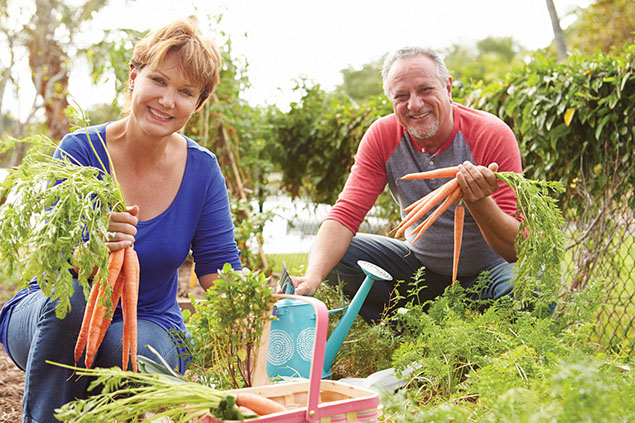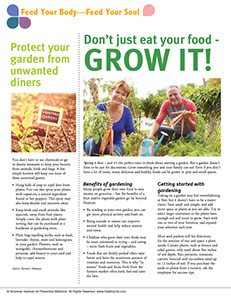SYMPTOM CHECKER
CONDITIONS
Male
Female
Child
Arm, Hand & Shoulder Concerns
Legs & Feet Concerns
Dental & Mouth Concerns
Ear & Nose
Eye Conditions
Head Conditions
Arm, Hand & Shoulder Concerns
Legs & Feet Concerns
Front
Back
Arm, Hand & Shoulder Concerns
Dental & Mouth Concerns
Ear & Nose
Eye Conditions
Head Conditions
Arm, Hand & Shoulder Concerns
Dental & Mouth Concerns
Ear & Nose
Eye Conditions
Head Conditions
Front
Back
Arm, Hand & Shoulder Concerns
Neck Links
Head & Neck Concerns
Arm, Hand & Shoulder Concerns
Neck Links
Head & Neck Concerns
Front
Back
Online Clinic
Wise Healthcare
Don’t just eat your food -
grow it!
Print on Demand
Spring is here – and it’s the perfect time to think about starting a garden. But a garden doesn’t have to be just for decoration. Grow something you and your family can eat! Even if you don’t have a lot of room, many delicious and healthy foods can be grown in pots and small spaces.
Benefits of gardening
Many people grow their own food to save money on groceries – but the benefits of a fruit and/or vegetable garden go far beyond finances:
• By tending to your own garden, you can get more physical activity and fresh air.
• Being outside in nature can improve mental health and help reduce anxiety and stress.
• Children who grow their own foods may be more interested in trying – and eating – more fresh fruits and vegetables.
• Foods that are freshly picked often taste better and have the maximum amount of vitamins and nutrients. This is why “in season” foods and those fresh from the farmers market often look, feel and taste the best.
Getting started with gardening
Taking on a garden may feel overwhelming at first, but it doesn’t have to be a major chore. Start small and simple, and add more space or plants as you are able. Try to select larger containers so the plants have enough soil and room to grow. Start with one or two of your favorites, and expand your selection each year.
Most seed packets will list directions for the amount of sun and space a plant needs. Certain plants, such as lettuce and salad greens, only need about five inches of soil depth. But, potatoes, tomatoes, carrots, broccoli and cucumbers need up to 12 inches of soil. If you purchase the seeds or plants from a nursery, ask the employee for success tips.
Protect your garden from unwanted diners
You don’t have to use chemicals or go to drastic measures to keep your bounty from animals, birds and bugs. A few simple barriers will keep out most of these uninvited guests:
• Hang balls of soap to repel deer from plants. You can also spray your plants with capsaicin, a natural ingredient found in hot peppers. This spray may also keep skunks and raccoons away.
• Keep birds and small animals, like squirrels, away from fruit plants. Simply cover the plants with plant netting that can be purchased at a hardware or gardening store.
• Plant bug-repelling herbs, such as basil, lavender, thyme, mint and lemongrass, in your garden. Flowers, such as marigolds, chrysanthemums and petunias, add beauty to your yard and help to repel insects.
Source: Farmer’s Almanac
This website is not meant to substitute for expert medical advice or treatment. Follow your doctor’s or health care provider’s advice if it differs from what is given in this guide.
The American Institute for Preventive Medicine (AIPM) is not responsible for the availability or content of external sites, nor does AIPM endorse them. Also, it is the responsibility of the user to examine the copyright and licensing restrictions of external pages and to secure all necessary permission.
The content on this website is proprietary. You may not modify, copy, reproduce, republish, upload, post, transmit, or distribute, in any manner, the material on the website without the written permission of AIPM.
2021 © American Institute for Preventive Medicine - All Rights Reserved. Disclaimer | www.HealthyLife.com
















































